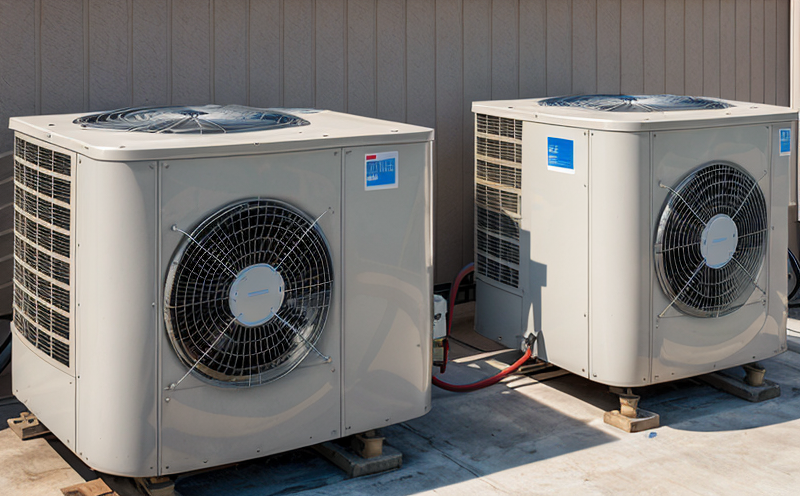ISO 50018 Measurement of Energy Performance with Smart Controls
The ISO 50018 standard is a key framework that ensures HVAC (Heating, Ventilation, and Air Conditioning) equipment operates efficiently. This service focuses on the measurement of energy performance using smart control systems in accordance with ISO 50018 guidelines. The primary objective is to provide accurate, reliable data for optimizing HVAC system efficiency while reducing overall energy consumption.
Smart controls play a crucial role in modern HVAC systems by integrating advanced sensors and automation technology that can monitor and adjust various parameters such as temperature, humidity, airflow, and more. By leveraging these smart systems, we ensure that your HVAC equipment operates at its optimal level, minimizing unnecessary energy use and costs.
The process begins with thorough preparation of the test specimen, which includes a detailed inspection to identify any potential issues or areas for improvement. Our team then installs specialized sensors and other monitoring devices required for accurate measurement according to ISO 50018 standards. This setup allows us to capture real-time data on energy consumption and performance metrics.
Once the instrumentation is in place, we conduct a series of tests under controlled conditions that simulate typical operational scenarios. These tests are designed to evaluate how well your HVAC system performs across different environments and load levels. We pay particular attention to ensuring that all measurements adhere strictly to ISO 50018 requirements.
The next step involves analyzing the collected data using advanced software tools tailored specifically for interpreting energy performance metrics within an intelligent control framework. Based on this analysis, we generate comprehensive reports detailing both current performance and potential improvements needed to enhance efficiency further.
It's important to note that compliance with ISO 50018 not only helps organizations meet regulatory requirements but also provides valuable insights into reducing operational costs through better management of energy resources. By adhering closely to these standards during testing, we ensure that the results obtained are valid and can be trusted by stakeholders.
Furthermore, implementing smart controls based on ISO 50018 guidelines allows for continuous improvement in HVAC performance over time. Regular monitoring enables timely identification of any deviations from expected behavior, allowing proactive adjustments before they become problematic issues affecting overall system reliability.
Why It Matters
The importance of measuring energy performance with smart controls cannot be overstated, especially given the increasing emphasis on sustainability and environmental responsibility. As global concerns around climate change grow, so too does the need for businesses to adopt more efficient practices that reduce their carbon footprint.
- Compliance: Adhering to ISO 50018 ensures your organization meets legal requirements set forth by relevant authorities.
- Economic Benefits: Reduced energy costs translate directly into savings for your business, improving profitability and competitiveness in the market.
- Sustainability: By optimizing HVAC systems according to these best practices, you contribute positively towards reducing greenhouse gas emissions associated with heating, ventilation, and air conditioning processes.
- Reputation Enhancement: Demonstrating commitment to sustainability can enhance your company’s reputation among customers who value eco-friendly products and services.
In addition, regular monitoring allows for early detection of potential malfunctions or inefficiencies within the HVAC system. Early intervention helps prevent costly repairs down the line while ensuring uninterrupted service during peak periods when demand is highest.
Scope and Methodology
| Key Components | Description |
|---|---|
| Smart Control System Installation | Involves deploying advanced sensors and automation technology capable of monitoring multiple parameters. |
| Data Collection | Real-time gathering of energy consumption and performance metrics from the installed controls. |
| Analytical Software Utilization | Interpreting collected data against ISO 50018 standards to determine system efficiency levels. |
| Compliance Verification | Evaluating whether all measurements adhere strictly to the prescribed guidelines. |
- Initial Inspection: Conducting a thorough examination of the HVAC equipment prior to installation of smart controls.
- Sensor Deployment: Positioning appropriate sensors at strategic locations within the system for optimal data collection.
- Data Analysis: Using specialized software tools designed specifically for analyzing energy performance metrics according to ISO 50018 standards.
- Reporting: Preparing detailed reports summarizing findings and recommendations for improving efficiency further.
International Acceptance and Recognition
- ISO Standardization: The International Organization for Standardization (ISO) has recognized ISO 50018 as the benchmark for measuring energy performance in HVAC systems globally.
- American National Standards Institute (ANSI): Many American organizations have adopted this standard, emphasizing its importance within North America.
- British Standards Institution (BSI): The UK's leading standards body has endorsed ISO 50018, highlighting its relevance for businesses operating in the United Kingdom.
- European Committee for Standardization (CEN): Recognized as a key document guiding HVAC professionals across Europe.
- Regulatory Compliance: Meeting stringent regulatory requirements imposed by various countries worldwide.
- Market Differentiation: Standing out in competitive markets by demonstrating leadership in sustainable practices.
- Customer Satisfaction: Providing high-quality services that exceed customer expectations regarding energy efficiency and cost savings.





